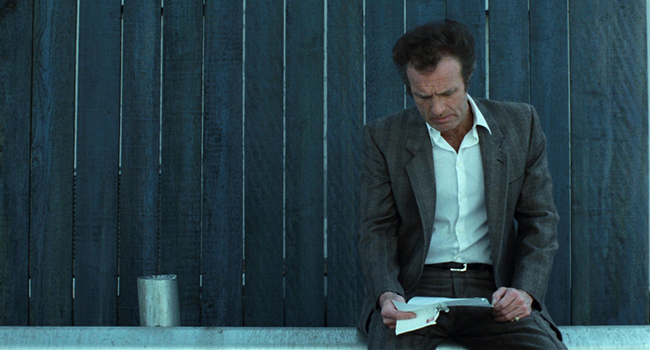
The Black Maria Review: Michael Mann’s Thief (1981)
Written by: Drew Morton, Special to CC2K
The Black Maria’s Drew Morton reviews the recent Criterion Collection Dual-Format release of Michael Mann’s 1982 directorial debut, Thief.
Michael Mann’s Thief (1981) — his theatrical debut — not only expresses many of his preoccupations on a small canvas but stands as one of his best films. An auteur of masculine melodramas, Mann’s genre riffs always seem to involve men expounding their philosophies towards life and work (the lives of Mann’s men are almost always defined by their professions) while sitting at booths in diners and attempting to realize dreams that can fit within a photograph. Thief marks not only the temporal origin of these preoccupations, many of which would become operatically reheated in Heat (1995), but also a purity and distillation that the latter films lacks due to its grandiose scope and the semi-“Hoo-ah!” performance of Al Pacino. Essentially, if I prefer Thief, it is because it resembles the cinema of Jean-Pierre Melville more than that of Michael Bay.
Mann’s film begins with a stunning ten minute, nearly silent, heist sequence in which Frank (James Caan) cracks a safe. Like Mann’s later work in Manhunter (1986) and Miami Vice (1984-1990), the sequence provides a meticulous breakdown of action – it becomes a tutorial in safe cracking – that shimmers with style thanks to a combination of extreme close ups of mechanisms and technology and the director’s groundbreaking use of Tangerine Dream’s electronic score (I cannot imagine the opening of Nicolas Winding Refn’s 2011 film Drive without equal parts Walter Hill, William Friedkin, and Michael Mann). The emphasis the film places on the systematic preparation of criminal activity – both with regard to narrative and style – is one of the traits that makes Mann’s voice so unique and memorable.

Yet, Thief isn’t an empty exercise in style either. While it would be fine if it was, the director also provides us with one of his most fully realized anti-heroes. In a sequence that would later find a re-interpretation in Heat, Frank proposes to a down and out waitress (Tuesday Weld) by telling her his life story. He was thrown in jail at a young age and, after killing another man while protecting himself during an attempted gang rape, has only recently emerged. He is trying to catch up for this lost time by cutting to the chase; he’s trying to win the life he has always wanted while also realizing that it may endanger his profession. Like Robert DeNiro in Heat, Frank has kept himself clear of all ties in case of death or incarceration. Like Jamie Foxx in Collateral, Frank clings to a photographic representation of his fantasy life. The scene exemplifies one of Caan’s best performances, giving him enough material to make a show out of simultaneously revealing and hiding himself.
Mann’s characterization of Frank is continuously deepened by implication, some of which occasionally boils up to the surface. For instance, midway through the film, Frank’s desire to adopt a child is thwarted by his criminal background. His subsequent anger and displeasure culminates in the reveal that he was also state raised. Yet, particularly when it comes to the relationship between Frank and his mentor (Willie Nelson…yes, that Willie Nelson), Mann allows us to connect the dots in our own way.

However, like most heist pictures, Thief centers around a professional who – on the verge of walking away – is sucked back into the underworld for one last score. From the standpoint of how strongly it embraces this generic trope, the film can be a bit frustrating. Specifically, Frank, a man who seems to have gone years without taking the risk, tempts formulaic fate down when he re-aligns his rogue operation with a local gangster, gets married, and adopts a kid. Viewers familiar with the genre and its traits know that this is the criminal equivalent of the cop who, on the verge of retirement, buys a boat named “Tomorrow” and is – unsurprisingly – killed in the line of duty during his last shift. Still, Mann seemingly always finds a way to elevate generic material with his mastery of film form and Thief is no exception to the rule.
Unfortunately, the Criterion Collection’s dual-format treatment of Thief is a tad underwhelming. Admittedly, the image (perfectly color timed to hit that cold color palate that Mann utilizes throughout) and sound (Tangerine Dream in DTS 5.1 on the Blu!) are the main event here and they do not disappoint. However, the central bonus feature — an archival commentary with Mann and Caan — is a bit too loose and shaggy. Long periods of silence and non-contextualized observations abound. Eclipsing the commentary are three interviews (one with Mann, one with Caan, and one with Tangerine Dream) that give us many of the same anecdotes that the commentary provides in half the time.
One piece I would have loved to see on the disc? An isolated musical score.
I could listen to Tangerine Dream all day.
This review was originally published at The Black Maria.
